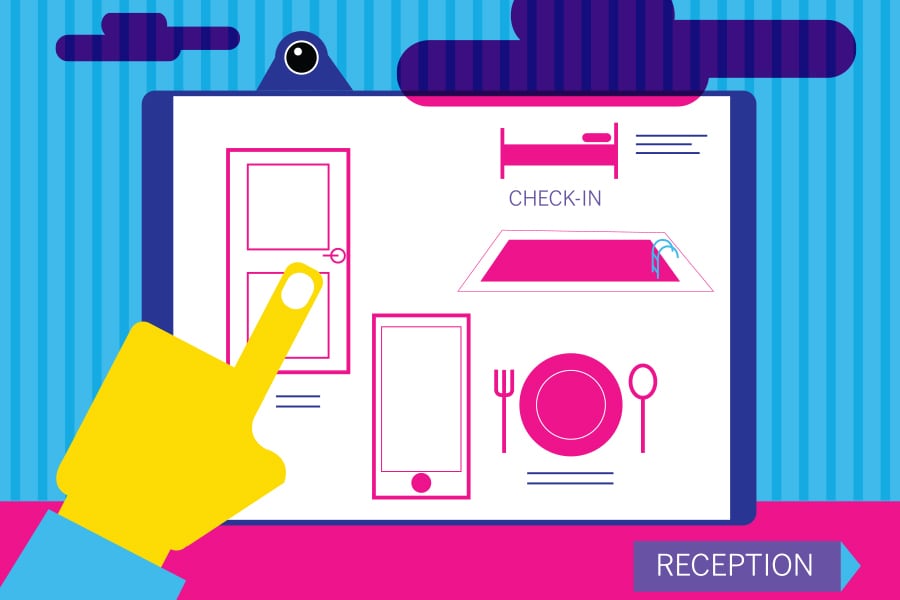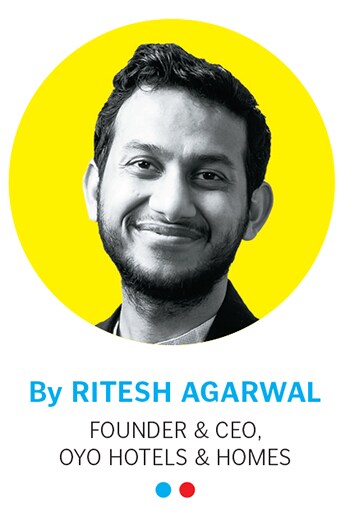'The definition of travel is changing': Oyo's Ritesh Agarwal
As millennials opt for quality experiences at affordable prices, the hospitality sector must leverage technology to stay ahead of the curve


 Illustration: Smaeer Pawar[br] Travel is not new. It is as long as human history. The explorers, nomads and travellers of yore helped in shaping the modern world and our multicultural society. As an industry, it has enabled millions of livelihoods.
Illustration: Smaeer Pawar[br] Travel is not new. It is as long as human history. The explorers, nomads and travellers of yore helped in shaping the modern world and our multicultural society. As an industry, it has enabled millions of livelihoods.
The litmus test for a hospitality market, however, is how to offer a high-quality customer experience day after day to travellers whose choices and preferences are constantly evolving. This is where technology can make all the difference. Technology is not only fuelling the rapid growth and transformation of India’s hospitality sector, but it is also playing a crucial role in consolidating its various fragments. Today, every touch point in the journey of a guest and an asset owner is powered by technology: From booking a room within seconds, ordering food via a mobile app or voice-controlled amenities in a room to running a hotel on an operating system powered by cutting-edge technology, everything is available at the touch of a button. What was defined as the future of hospitality till yesterday is today’s reality.
Hospitality players are deploying different levers to offer better guest experience across all touch points. The sector has a huge opportunity in the coming decade as, according to the UN World Tourism Organization estimates, international tourists are projected to reach 1.8 billion by 2030. To serve this massive demand, the industry is undergoing a fundamental shift. Traditional methods of running hotels are slowly being replaced by more technology-enabled and experience-driven models that also offer a range of focussed and customised services for short or long term stays in the form of vacation homes or managed living spaces.
Democratisation of travel
As the seventh-largest country in the world with 4,000-plus cities, India’s tourism industry offers huge untapped potential. Infrastructural development and increased internet penetration have chalked out new destinations. Traffic is now moving to Tier II, III and IV cities, which generate a strong demand for quality stays. The opportunity is immense. The global accommodation market stands at approximately 160 million rooms and it is worth about $3.6 trillion. We are just scratching the surface with millions of rooms yet to be standardised.
"The 2010s saw the revolutionisation of travel": Booking.com"s Ritu Mehtorta
Millennials driven by value for money
Today, travel is among the biggest priorities for millennials and exploring new destinations is their investment. They are spending more on experiences like adventure and food while familiarising themselves with the local culture. People are on a constant lookout for quality experiences but at pocket-friendly prices. Modern travel concepts like staycations, leisure travel that combines business with leisure are on the rise.
At Oyo, we have seen that the budget category is the most-preferred choice of today’s travellers and the ‘Budget for Leisure’ segment is growing owing to changing socio-cultural factors like the emergence of the nuclear family, independently living students and working professionals, access to a plethora of quality experiences at varied price points.
Our annual Travelopedia for 2019 unveiled interesting shifts in 2019 with changing consumer preferences. Over 92 percent of our bookings in India were driven by the Oyo mobile app, depicting the increasing stronghold of internet on how we travel.
Emergence of tech-reliant travellers
Hyper-growth in the fintech industry is a boon for travellers as processes have become cashless. One can pay for their hotel room, cab or food even in the remotest of locations by scanning a QR code on their smartphones. The definition of travel is changing. The processes are becoming smarter and technology is making it hassle-free. According to a report by Bain & Company, nearly 35 percent of Indians will book their travels online by 2021.
The changing face of hospitality
Any industry, with the clever use of technology, holds the calibre to innovate, disrupt and mark its own path to agile growth. Until a few years ago, the hospitality industry was human intensive with small, medium and big players striving to offer quality experiences through its vast resource pool. The use of innovative technology solutions, standardisation of services, amenities and in-room experience help maintain service standards.
As we continue to make progress in artificial intelligence and machine learning, especially in the customer experience management segment, personalisation and responsiveness of tools and app features continue to improve dramatically. Brands are investing in augmented reality and natural language processing to deliver a seamless and delightful guest experience. The world of hotel interiors started sans originality or artistic direction. Rooms were built for durability and practicality. They were of a neutral tone with chintzy art mounted on the walls. However, lately, hoteliers have realised that comfort and ease alone are not enough it’s the finer differentiations that the evolved customer seeks.
"AI in retail is the next step": Big Basket"s Hari Menon
As the global hospitality marketplace evolves and travellers’ preferences shift, the industry yearns for innovation. Be it hotel brands or independent operators, everyone is seeking ways in which they can differentiate themselves to gain their own unique space in an increasingly crowded marketplace. At Oyo, we have always tried to stay ahead of the curve. From using modular elements like large photo frames of the vintage era to using unconventional illustrations and a colour scheme for our design homes, we have been successfully experimenting with several concepts.
Change and innovation have mandated hotels to shun blanket uniformity for finer aesthetics. With a focus on art and all things unique, Oyo believes visual perspectives have a lot to offer when it comes to boosting customer experience.
It is a rich source that can be played around to change the way people look at a hotel.
In today’s day and age, the Darwinian evolutionary theory holds true for businesses as well. Technology has emerged as the single-most important factor that impacts every aspect of how things are done. The hospitality sector, therefore, needs to embrace technology for meeting the needs of the contemporary traveller. Artificial intelligence, Internet of Things, cloud computing, voice and facial recognition, biometrics, robotics, virtual and augmented reality aren’t just buzzwords. They are crucial tools which power the sector and drive a paradigm shift.
In the days to come, scalable and robust tech DNA will catapult the hospitality industry onto another growth trajectory, perhaps at the speed of thought.
First Published: Jan 07, 2020, 11:23
Subscribe Now